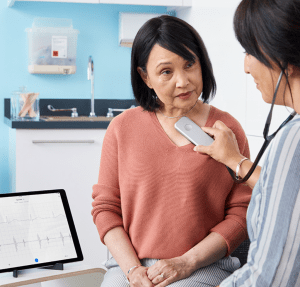It’s hard to compete against the Apple Watch or even an app on your phone when it comes to personal heart rate monitors these days. However, Eko, a startup best known for creating an electronic stethoscope to monitor your heart rhythm, hopes further research and development will help give its more clinically promoted device a leg up as a leader in the fight against heart disease.
To get there, the company recently closed on a $20 million round of Series B financing, led by Artis Ventures. New and returning investors in the round also include DigiTx Partners, NTT Venture Capital (NTTVC), 3M Ventures, Mayo Clinic, Seraph Group, and XTX Ventures.
On top of that, the company has teamed up with some well-known health partners such as the Mayo Clinic, Northwestern Medicine and Sutter Health, to further connect data points and screen patients using the Eko device.
 It’s no leap to say technology has made great strides in cardiac care in the last decade. Today, we can use a number of devices to find out if there’s some sort of arrhythmia in a matter of seconds. However, choosing the way we do that is critical — getting the right information from trained professionals before jumping to conclusions is even more necessary.
It’s no leap to say technology has made great strides in cardiac care in the last decade. Today, we can use a number of devices to find out if there’s some sort of arrhythmia in a matter of seconds. However, choosing the way we do that is critical — getting the right information from trained professionals before jumping to conclusions is even more necessary.
It also does more than just test your heart rate, Eko co-founder and COO Jason Berler told Techcrunch. “While Eko helps screen for AFib, we’re also focused on screening for structural heart diseases and heart failure, which Apple is not,” he said. “Eko captures both heart sounds and EKG simultaneously, giving physicians the most holistic assessment of a patient’s health, and the information needed to make better-informed decisions.”
While Eko faces stiff competition from many heart rate monitoring devices out on the market today, it seems to grasp the need to go beyond a simple heart rate app for further knowledge on determining heart health through doctors and specialists who can identify and further inform patients in need.
“Eko is transforming cardiac care as we know it,” Artis Venture partner Vasudev Bailey said in a statement. “They are the perfect example of how machine learning using quality data sets can positively influence patient outcomes and improve quality of care. This demonstrates the potential for an immense pipeline of life-saving applications where sound can aid in the screening of many other diseases.”